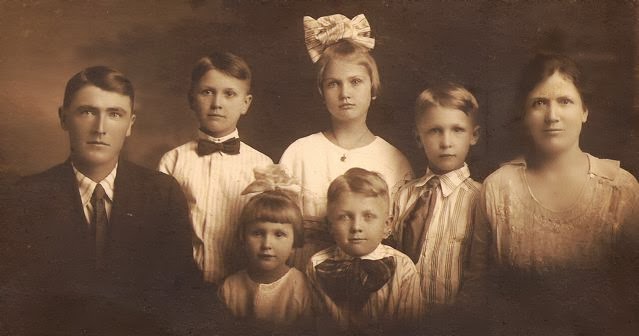To tell the story only of my great-grandfather Daniel A.
Troutman during the Civil War without adding the story of his brothers,
especially two who fought beside him, would be to omit key elements. Daniel had six brothers: Jacob (1821-1891), Henry Martin (1825-1904), Robert
Leonard (1827-1918), John Burette (1833-1864), Adam Carmi (1841-1911), and
Theophilus Falls (1849-1935).[1]
As in many families in North Carolina, opinions about the war varied among
the sons of Henry Troutman.
The oldest, Jacob, does not appear in Civil War service
records for North Carolina. Jacob is reported to have had some sort of “spells”
during which he mind was affected. As a
result, his neighbors called him “Crazy Jake.” These attacks probably kept him
from being conscripted.
The next brother, Henry Martin, opposed secession,
so when a regiment of Union soldiers marched through the area, he allowed them
to encamp on his land and provided them with food. This action was credited to
having saved the surrounding area from
being plundered and destroyed.[2]
For Robert Leonard and Theophilus Falls, there seems to be no record of military service.[3] Theo
was very young at the start of the war, only 12, but R. L. was of age. He
somehow managed to keep out of the fray.
As for John, Daniel, and Adam, the war had been in progress
for a year before the latter two joined the 48th North Carolina
regiment, and longer than that for John. Daniel and Adam volunteered on 1 March
1862, and were mustered in 17 April, the day following passage of the
Confederate Conscription Act.[4]
Perhaps
more reluctant to join the military because he had a wife and two small sons,
John stayed home as long as he could, but he was conscripted 1 August 1862 and
joined his brothers in the 48th.[5] The
Troutman brothers’ reluctance to sign up and march off to war at the outset, as
so many young men did, suggests the differences of opinion that may have
occurred in discussions in their family about the war.
Unlike people living in the Deep South where secession was cheered,
where emotions ran high, where the economy was heavily dependent on slaves to
work cotton plantations, those living in the Upper South were less eager to
secede and loyalties were divided. The latter were leery of both zealous
secessionists and adamant abolitionists. They wanted to work within the Union
to procure opportunities for economic growth and due regard for Southern rights.[6]
In the Piedmont area of North Carolina, the people generally
were not cotton planters, but farmers who worked the land on their own or with
the help from their sons. Their crops included barley, corn, oats, rice, rye,
sweet potatoes, and tobacco. Generally, they did not own slaves and did not want
to own them.[7] Many
non-slave owners, nonetheless, did not approve of large scale freeing of
slaves. They feared the chaos it might bring, and they didn’t want former
slaves in competition for jobs on the same level with poor whites.[8] They
viewed slavery as necessary for keeping social order, but not a particularly
admirable institution.[9] In
other words, they saw it as a necessary evil. Issues were very complicated, not
defined clearly, not simplistic.[10]
Until Lincoln was elected, most North Carolinians were
against secession. His election showed that they were more pro-North Carolina
than pro-Union.[11] The
catalyst for secession for North Carolina occurred when the North mobilized
troops and sent them South.[12]
North Carolina was the last state to secede, which they did on 21 May 1861
“only grudgingly” to prevent warring against its neighboring states.[13]
Ironically, North Carolina is closely tied with Virginia in sacrificing more of
its men to the war than any other state.[14]
[1] Thomas
L. Troutman, ed., Descending Jacob’s
Ladder (Unknown place: Unknown publisher, 1993), 51.
[2]
Troutman, Descending Jacob’s Ladder, 62.
[3] A
search of Civil War service records on Fold3 and Ancestry.com produced negative
results for Robert Leonard and Theophilus Falls. Also in Robert Leonard’s
profile in Descending Jacob’s Ladder,
page 62, there is no mention of military service, nor a reason that he may not
have served.
[4] Adam
C. Troutman, Muster Rolls of Co. C, 48th North Carolina Infantry, 1861-1865, database
Fold3 (http://www.fold3.com/image/20/49857893/ : accessed 10 September
2014); NARA M270, roll 0472. Also, Daniel A. Troutman,
Muster Rolls of Co. C, 48th North Carolina Infantry, 1861-1865, database Fold3
(http://www.fold3.com/image/20/
49858276/ : accessed 10 September
2014); NARA M270, roll 0472.
[5] John
B. Troutman, Muster Rolls of Co. C, 48th North Carolina Infantry, 1861-1865,
database Fold3 (http://www.fold3.com/image/271/49858394/ : accessed 10
September 2014); NARA M270, roll 0472.
[6]
William R. Trotter, Silk Flags and Cold
Steel: The Civil War in North Carolina: The Piedmont (Winston-Salem, North
Carolina: John F. Blair, Publisher, 1988), 11.
[7]
Trotter, Silk Flags, 12.
[8]
Trotter, Silk Flags, 11.
[9]
Trotter, Silk Flags, 13.
[10]
Trotter, Silk Flags, 14.
[11]
Trotter, Silk Flags, 13.
[12]
Trotter, Silk Flags, 15, 20.
[13]
Jennifer L. Larson, “Highlights: A Free and Independent State: North Carolina
Secedes from the Union,” Documenting the
American South (http://docsouth.unc.edu/highlights/
secession.html : accessed 25 September 2014).
[14]
Cameron McWherter, “Numbers War Between the States: New Research Questions Who
in the Confederacy Had the Most War Dead,” The
Wall Street Journal, 26 March 2011 (http://online.wsj.com/articles/SB10001424052748704662604576202823930087328
: accessed 25 September 2014). Also, “Civil War Casualties: The Cost of War:
Killed, Wounded, Captured, and Missing,” Civil
War Trust (http://www.civilwar.org/education/
civil-war-casualties.html : accessed 25 September
2014).
© 2014, Z. T. Noble




Hi Zola, I wanted you to know that I have nominated you and your blog for the One Lovely Bog Award. http://carolinafamilyroots.blogspot.com/2014/10/one-lovely-blog-award.html
ReplyDeleteThank you, Charlie. I guess I'm out of the loop because I was not aware of this Lovely Blog Award. Now I am. What a fun thing!
Delete